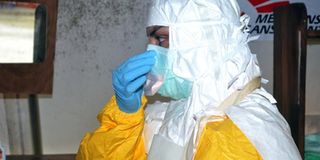15-minute Ebola test on trial in Guinea

A member of Doctors Without Borders at the isolation ward of Donka Hospital on July 23, 2014 in Conakry, Guinea. The Wellcome Trust and UK government said on November 28, 2014 that British researchers are to conduct trials in Guinea on a 15-minute Ebola test. PHOTO | CELLOU BINANI |
What you need to know:
- The prototype is six times faster than current tests and aims to speed up diagnosis.
- The biggest Ebola epidemic on record has claimed around 5,700 lives in West Africa since the beginning of the year, according to the World Health Organisation — almost all of them in Guinea, Liberia and Sierra Leone.
CONAKRY
British researchers are to conduct trials in Guinea on a 15-minute Ebola test, the Wellcome Trust and UK government said in a joint statement Friday.
The prototype is six times faster than current tests and aims to speed up diagnosis, the London-based global research charity and the Department for International Development said.
“A reliable 15-minute test that can confirm cases of Ebola would be a key tool for effective management of the Ebola outbreak, allowing patients to be identified, isolated and cared for as soon as possible,” said Val Snewin of the Wellcome Trust.
She said the test was designed to be suitable for remote field hospitals where electricity and cold storage are often scarce.
Early detection of Ebola leads to better infection control as medics can identify and isolate confirmed cases faster and start treating patients sooner.
The trials will be led by researchers from Dakar’s Pasteur Institute at an Ebola treatment centre in the Guinean capital Conakry in the coming weeks.
TWO MORE LABORATORIES
Britain already has an Ebola laboratory in Sierra Leone and is building two others in its former colony.
“Together these will quadruple the number of tests that can be carried out every day and help contain the spread of Ebola,” International Development Secretary Justine Greening said in the statement.
The biggest Ebola epidemic on record has claimed around 5,700 lives in West Africa since the beginning of the year, according to the World Health Organisation — almost all of them in Guinea, Liberia and Sierra Leone.
In October France’s Atomic Energy Commission announced that another 15-minute test had proved effective in high-security laboratory trials, although it has not yet been validated by regulators.





